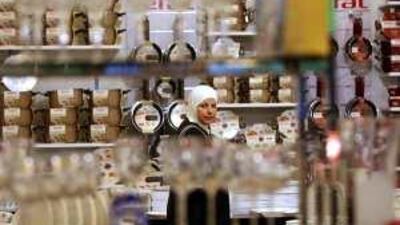Ahmad Aweidah sees the estimated 11 million Palestinians living outside their historic homeland as the best growth opportunity for one of the region's better-performing bourses. "Palestine doesn't have oil," Mr Aweidah, the chief executive of the Palestine Securities Exchange (PSE) told investors in London this month at the bourse's roadshow.
"What it does have is a pool of wealthy, educated and experienced people in the diaspora, who hold significant capital assets that could be mobilised to invest in Palestinian equities." In addition to the London-based frontier funds with an interest in emerging market bourses, the Nablus-headquartered exchange is looking to tap into the estimated US$70 billion (Dh257.11bn) of capital held by Palestinians who live outside the West Bank and Gaza.
Despite some impressive growth rates from its listed companies, the PSE is seeking outside investment. Attracting institutional investors from London is part of its strategy, but a long-term ambition is to pull in diaspora investment, as Lebanon did over the past 20 years. "For us, this is one of the main lines of action, to mobilise this diaspora into the exchange," said Mr Aweidah. "It is estimated that the Palestinian diaspora has assets anywhere between $70bn and $100bn, and that explains why our first international roadshow was to Chile [in May] last year, as that is where the largest diaspora with significant means is based."
Chile's population of 500,000 people of Palestinian origin make it the second largest such community after Jordan. Chileans of Palestinian origin own some of the country's largest media groups and six of the country's eight domestic banks. The visit to Santiago proved a success. Fifteen Chileans of Palestinian origin returned the favour and visited the West Bank last December. A mutual fund of $25 million has been set up to allow anyone in Chile to invest in Palestinian stocks on the PSE. And a Chilean football team plans to list on the West Bank bourse by May of this year.
The PSE is also aiming for investors and listings closer to home, in Jordan, the Gulf and even the Arab citizens of Israel. "There are about 1.4 million Palestinians who are Israeli citizens and a number of those people are owners of good, sizeable companies - all of them family owned and extremely reluctant to go to IPO [initial public offering] on the Tel Aviv exchange," said Mr Aweidah. PSE officials have already held meetings with Palestinian business leaders and have invited delegations of businesspeople to visit the exchange.
"The regulator, the Palestine Capital Market Authority, has been more than forthcoming in allowing us to amend the listing regulations to enable those companies to list on the exchange," Mr Aweidah said. "We have set ourselves the target of attracting between five and 10 Israeli-based Palestinian companies over the next two to three years, and I firmly believe that once we have the first one, it will be plain sailing and that will automatically add another 1.4 million potential investors into the PSE."
Listing liquid, well managed, largely family-run Israel-based Palestinian firms would also help to diversify the exchange, which is dominated by the three heavyweights, the PalTel group, the Palestine Investment and Development Company and Bank of Palestine. The Israeli government earlier announced plans to invest $214m to boost economic activity in Arab towns over the next five years, aimed at Umm el-Fahm, Nazareth, Sakhnin, Shfaram, Kalansawa, Maghar, Tamra, Tira, Kfar-Qasim and Rahat.
It followed a report in January by the Organisation for Economic Co-operation and Development, which Israel is seeking to join, sharply criticising the government for discriminating against Israeli Arabs in jobs and services. business@thenational.ae

